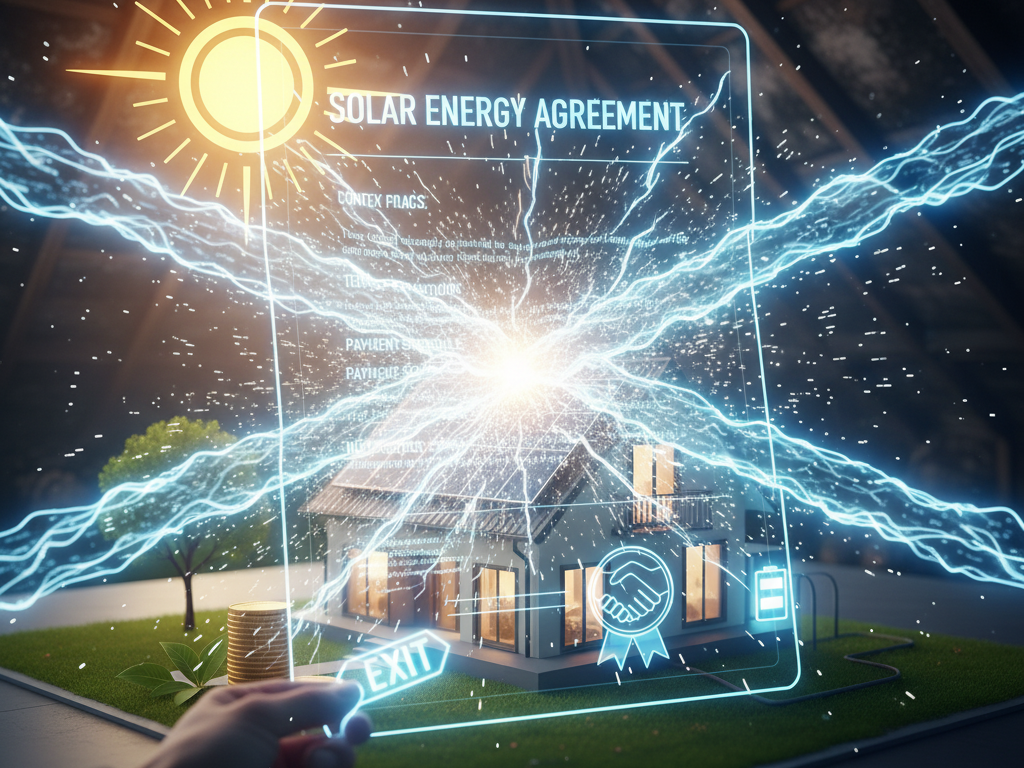“I signed a 25-year solar lease… but my bill isn’t lower, my roof warranty is in question, and now I just want out. Am I stuck forever?”

You are not alone. Thousands of homeowners each year feel trapped in long-term solar contracts — often for 15, 20, or even 25 years. These agreements can make financial sense at first, but life changes, hidden clauses, or poor system performance can flip that equation.
The problem is that solar contracts aren’t as easy to cancel as other services. They are legally binding, often tied to financing or property liens, and walking away without following the right path can result in early termination fees, lawsuits, or severe credit damage.
The good news? In many situations, there are legal and contractual ways to exit — but you need to know which path applies to your contract, your state, and your circumstances.
So, Can You Get Out?
Yes.
In many cases, you can get out of a solar contract. Options range from buyouts and transfers to performance disputes and, in cases of fraud or misrepresentation, full contract cancellation.
But here’s the critical point — your exit path depends on the exact type of contract you signed (lease, PPA, or purchase agreement), as well as your state’s consumer protection laws.
Walking away without a plan can make the situation worse. You could end up owing more than if you had stayed put and negotiated or challenged the agreement.
Reasons Where It’s Absolutely Okay To End a Solar Contract
Not every homeowner looking to terminate a solar agreement is being “difficult” or acting out of buyer’s remorse. There are valid, legally arguable circumstances in which ending or restructuring a solar contract makes sense.
1. Financial Burden Exceeds Benefits
Your monthly payment or escalating lease rate is higher than your actual utility bill savings. Many contracts include annual escalation clauses of 2–4% that, over a decade or more, completely wipe out your net savings.
- This is especially common when utility rates stay flat or fall, making projected savings unrealistic.
- A review of your original production guarantee versus your actual output is often the first step in proving the mismatch.
2. Moving or Selling Your Home
Long-term solar leases and PPAs (Power Purchase Agreements) present a unique challenge in real estate transactions: many buyers don’t want to assume the contract.
- If your sales contract requires the buyer to take over, any reluctance can tank the sale price or drive away buyers entirely.
- Some lenders are also cautious about underwriting homes with encumbered solar leases — especially if a UCC-1 lien is filed against the property.
3. Poor System Performance
If your system is producing significantly less energy than promised — and you have documentation — it may qualify as a breach of contract or a trigger for performance-based cancellation.
- Low output can stem from faulty installation, shading issues the installer failed to disclose, or unmaintained equipment.
- In some cases, manufacturers and installers point fingers at each other, leaving the homeowner stuck.
4. Misrepresentation or Fraud During the Sales Process
Some homeowners were told outright falsehoods:
- That the system would be “free” after incentives.
- That the panels would eliminate 100% of their bill.
- That they could walk away “anytime” without penalty.
If you can prove these statements were made in a way that influenced your decision, you may have grounds for cancellation under state deceptive trade practice laws.
5. Warranty and Service Failures
If the company is ignoring repairs, maintenance requests, or warranty claims, that’s often a breach of contract — especially if the failure affects system output and your ability to realize the promised savings.
More Serious Cases Where You Need to Exit ASAP
Some situations are so high-risk that trying to “ride it out” can cost you thousands — or even lead to foreclosure on certain solar lien-based programs like PACE financing. If you see these warning signs, it’s time to act fast:
1. Escalating Payments You Can’t Afford
If your payment increases each year and you’re already stretched thin, you could eventually default — and defaulting gives the solar lender or lessor leverage to take aggressive collection action.
2. Contract Clauses That Penalize Home Sale
Some leases and PPAs contain fine print saying you must fully pay out the contract if the next homeowner doesn’t assume it. This can leave you owing tens of thousands right before a move.
3. Unfulfilled Installation Promises
If promised features — like battery storage, net metering enrollment, or promised utility rebates — never happened, you may be paying for something less than what you agreed upon.
4. Provider’s Financial Instability
If your solar company is closing locations, laying off staff, or has a wave of BBB complaints, you risk being left without required service support. In some states, if the provider dissolves, you may still legally owe payments to the leasing company or financier.
5. Active or Pending Litigation Against Company
If your provider is facing lawsuits for fraud or breach, you may be able to join a group claim or use their misconduct as leverage to exit your own agreement.
💡 The bottom line: Waiting too long only narrows your exit options. If you recognize multiple red flags, consult a solar contract lawyer now before penalties escalate or opportunities for a smooth exit vanish.
5 Common Ways to Exit a Solar Contract
Every contract is different, but here are general strategies homeowners pursue when getting out:
Buyout from the Lessor or Lender
Many leases and PPAs have a buyout clause after a certain number of years — sometimes sooner if negotiated.
The buyout price can be high early on but may make sense to avoid years of escalating payments.
Transfer to a Home Buyer
If you’re selling, a willing buyer can assume the contract. This works best when the panels are well-performing and payments are low — but it can be a sticking point in negotiations.
Negotiate Early Termination
Some companies will agree to terminate if the system underperformed or the relationship is no longer workable — especially if faced with potential legal claims.
Performance-Based Exit
If your contract includes a production guarantee and the system consistently misses targets, you can use this as leverage for cancellation or major concessions.
Legal Challenge for Fraud or Misrepresentation
In cases where the sales process involved false promises or hidden terms, a legal challenge under state deceptive trade statues can void the entire agreement.
Know Your Legal Rights & Protections
If you’re stuck in a solar contract that no longer fits your needs, you may feel like you’ve lost control. But both federal and state laws give you important protections — especially when a company has misled you, failed to deliver on promises, or hidden key terms in the fine print. The key is understanding which laws apply and how they can be used to negotiate, fight, or exit your agreement.
Federal Trade Commission (FTC) Rules
The FTC enforces rules that protect consumers from deceptive or unfair sales practices. In the solar industry, this can include:
- False or exaggerated savings claims (e.g., “Your bill will be zero forever”)
- Misrepresentation of incentives (e.g., promising rebates that don’t exist)
- Hiding important contract terms or burying them in unreadable fine print
If you can show your decision to sign was based on these types of misrepresentations, the FTC considers that unlawful — and you may have grounds for contract rescission or other remedies.
State Consumer Protection Laws
Every state has its own version of a consumer protection act or unfair business practices law, but some stand out for their strength and homeowner-friendly provisions:
- California Solar Consumer Protection Guide: The Contractors State License Board requires installers to provide this guide before contract signing. Violations can undermine contract enforceability and create grounds for cancellation.
- Texas Deceptive Trade Practices Act (DTPA): Allows homeowners to recover up to three times their damages if the solar company knowingly misled them.
- New Jersey Consumer Fraud Act: Has one of the broadest definitions of fraudulent conduct in the country and can award attorney’s fees and treble damages if fraud is proven.
In these states (and others with similar laws), proving misrepresentation or deceptive practices can transform a seemingly “ironclad” contract into one you can legally exit: sometimes while also recovering money for your losses.
Contract Law & Uniform Commercial Code (UCC) Protections
Under traditional contract law, you have rights when:
- A company fails to perform as promised (breach of contract)
- The product: in this case, your solar panel system — fails to conform to what was agreed
- Warranties, either written or implied, are ignored or improperly denied
The Uniform Commercial Code (UCC), adopted (with variations) in most states, treats solar panels as “goods.” That means they carry implied warranties of merchantability (fitness for ordinary use) and sometimes fitness for a particular purpose. If your system is defective, poorly installed, or drastically underperforms, those protections can form the basis for demanding repair, replacement, or even contract termination.
💡 Takeaway: These laws aren’t just theoretical. Homeowners successfully use them every year to cancel bad solar deals, negotiate buyouts at reduced costs, and recover damages. But timing is crucial — the sooner you identify and act on your rights, the stronger your position.
5 Action Steps if You’re Considering an Exit
Feeling trapped is overwhelming, but taking clear, organized steps can turn a messy, frustrating situation into one where you’re actively moving toward a solution. Here’s how to start:
Step 1: Gather All Relevant Documentation
Collect every piece of paperwork from the sales process to today, including:
- The signed contract and all addendums
- Financing or lease agreements
- Copies of marketing materials or sales presentations
- Emails, text messages, or recordings with the salesperson
These documents are often the best proof of what was promised versus what was delivered. Sales brochures with exaggerated savings claims or emails promising “no penalties for early exit” can be game-changers in a legal review.
Step 2: Document System Performance
If poor performance or underproduction is one of your issues, back it up with evidence.
- Pull monthly or annual production reports from your monitoring app or inverter portal.
- Compare this data to your utility bills before and after installation.
If you can show a consistent shortfall compared to the production guarantee in your contract, you’ll have a strong claim for breach or renegotiation.
Step 3: Review Your Agreement for Exit Clauses
Read through your solar contract looking specifically for:
- Buyout clauses: when they kick in, how they’re calculated
- Transfer terms: what happens if you sell your home
- Early termination provisions: fees, penalties, or notice requirements
Many homeowners are surprised to find buyout options built in — but they’re buried deep in the document. Others find clauses that can void penalties if specific events happen, such as moving to a non-suitable property.
Step 4: Get Written Terms from the Company
Before making any decision:
- Contact your solar company or lessor and request written confirmation of your buyout price, transfer terms, or any exit options
- Avoid relying on verbal promises — if they’re not in writing, they’re unlikely to be honored
Step 5: Consult a Solar Contract Attorney Before Signing Anything
Engaging a lawyer early can save you thousands. A solar contract attorney can:
- Spot hidden clauses that strengthen your exit case
- Help you frame your request so you don’t accidentally waive rights
- Negotiate directly with the company — often leading to better terms than you could get alone
- File formal complaints with state and federal agencies if needed
💡 Pro Tip: Even if you think your case is “too small” for a lawyer, many consumer rights attorneys work on contingency in strong fraud or misrepresentation cases — meaning it may cost you nothing upfront to fight back.
You Are Not Stuck Forever
Signing a 15- or 25-year solar contract doesn’t mean you’ve lost control of your home or your future. If your bills are rising, your panels are underperforming, or you were misled into signing terms you never understood, you still have options. Homeowners across the country have broken free from contracts they thought were ironclad — and so can you.
At Bennett Legal, we help families escape bad solar deals every day. We know the clauses that companies don’t want you to see, the state protections they hope you don’t use, and the legal strategies that turn “no way out” into a clear path forward.
Here is how we take action for clients:
- We uncover hidden exit clauses. Buyouts, transfer terms, and cancellation rights that can be leveraged to your advantage.
- We challenge fraud and misrepresentation. If you were promised “free solar” or “cancel anytime” and that wasn’t true, we hold companies accountable under consumer protection laws.
- We fight abusive penalties. Escalating fees and unfair early termination clauses can often be negotiated, reduced, or struck down.
- We protect your credit and your home. From UCC lien removal to contract disputes, we make sure your property and finances are shielded while we work on your exit.
You do not have to stay chained to a contract that drains your wallet and your peace of mind. Bennett Legal is ready to review your agreement, explain your rights, and fight for the clean break you deserve.
📞 Call Bennett Legal today for a free consultation. The sooner you act, the more options we can put on the table — and the faster you can take back control of your home and your future.

